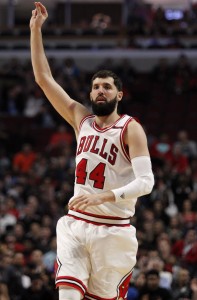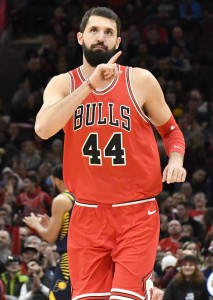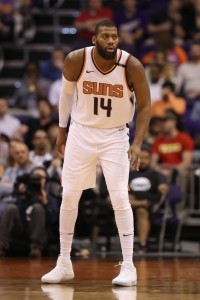One confusing aspect of the NBA’s salary cap is the fact that a team can function as an “over-the-cap” club despite its player salaries not exceeding this season’s $99MM cap. For instance, if a club with $80MM in player salaries also has $20MM in unrenounced exceptions (mid-level, bi-annual, traded player, etc.) and/or cap holds, that team is considered to be over the cap. Those exceptions could be renounced at any time if the club wants to use its potential cap room, but until that’s absolutely necessary, functioning as an over-the-cap team can help a franchise maximize its options.
The other two incoming players for Chicago were on one-year, minimum salary contracts, meaning the team could use the minimum salary exception to acquire them. Having utilized various exceptions to take on all three incoming players in the swap, the Bulls didn’t need Mirotic’s $12.5MM cap charge for salary-matching purposes. Since they essentially traded Mirotic for “nothing,” they’ll get a new trade exception worth $12,500,000, and will have up to a year to use it.
Of course, the Bulls could create more than $12.5MM in cap room by renouncing that new TPE and their other exceptions, but there’s no reason to do so at this point. If Chicago wants to use its cap room at any time – either to absorb a big contract in a trade or to sign a player in free agency – it will have to renounce those exceptions, including that big new one.
Mirotic loses his veto ability:
As we’ve noted whenever Mirotic’s name has surfaced in trade rumors, the veteran forward had a fairly unique ability to block any trade involving him this season. It was an ability he shared with just 17 other players around the league, afforded to him based on a CBA rule that says any player who re-signed with his previous team on a one-year contract will receive that veto power.
This rule was put in place to close a loophole. While most players don’t lose their Bird or Early Bird rights when they’re traded, a player in Mirotic’s situation would have. That way, a team couldn’t re-sign a player it doesn’t intend to keep, trading him a few months later and allowing his new team to use his Bird rights to sign him to a longer-term deal when his one-year contract ends.
Of course, Mirotic’s deal was actually a two-year pact, but since that second year was a team option, it was treated as a one-year contract unless and until that option was exercised. As soon as the Pelicans agreed to pick up that second-year option, Mirotic’s veto power disappeared.
The impact on the Pelicans’ 2017/18 roster, tax, and hard cap:
While Mirotic’s ability to veto a trade was one reason why the Pelicans and Bulls took a few extra days to figure out a trade, another potential roadblock that needed to be addressed was New Orleans’ proximity to the luxury tax line and the hard cap.
This season’s luxury tax line is $119,266,000 — a team that goes over that amount becomes a taxpayer. The hard cap (or “apron”) is $125,266,000, $6MM above the tax line. NBA teams don’t have a hard cap by default, but become hard-capped when they acquire a player via sign-and-trade, use their bi-annual exception, or use more than the taxpayer’s portion of the mid-level exception. The Pelicans used most of their MLE, so they were hard-capped this season.
Before acquiring Mirotic, the Pelicans were up against both thresholds. According to ESPN’s Bobby Marks (Twitter links), New Orleans only had about $623K in breathing room below the tax line and were just $1.2MM below the hard cap. Why was the team so close to the $125MM+ hard cap despite having a team salary below $119MM? Because multiple players on the roster, including Jrue Holiday, have unlikely incentives that count toward the hard cap, but not toward team salary (only “likely” incentives count toward team salary during the season).
The upshot was that the Pelicans couldn’t send out Asik’s $10,595,505 for Mirotic’s $12,500,000 salary and call it a day. That would have put the team both into the tax and over the hard cap — the former was undesirable, while the latter simply wasn’t allowed.
The Pelicans addressed this issue by including a pair of minimum salary players in the deal, sending Allen and Nelson to Chicago and clearing an extra $2,901,200 in team salary. As a result, New Orleans is actually in a slightly better position than before. According to Marks (Twitter link), the team is approximately $1.6MM below the tax threshold and $2.2MM below the hard cap. The Pelicans now have room to sign two players to prorated minimum salary contracts, and have two open roster spots to do so after dealing three players for Mirotic.
The impact on the Pelicans’ 2018/19 roster and tax:
Let’s circle back to Mirotic’s 2018/19 team option. It makes sense that Mirotic was willing to use his leverage to get that option exercised — he now has some financial security going forward. But why did it take so long for the Pelicans to get on board? Based on at least one account, the Bulls had to throw in a second-round pick to incentivize New Orleans to pick up that option and complete the deal. Shouldn’t the Pelicans have been happy to lock in a very productive Mirotic (16.8 PPG, 6.4 RPG, .474/.429/.823 shooting) at a reasonable rate of $12.5MM for next season?
In a vacuum, the Pelicans probably would have been happy to do just that. However, adding Mirotic’s $12.5MM salary to their books for 2018/19 may complicate their push to re-sign DeMarcus Cousins. Currently, according to Basketball Insiders’ data, the team has $92,790,622 in guaranteed money committed to seven players for next season. A maximum salary deal for Cousins is expected to start at around $30MM, which would push projected team salary up to approximately $122MM. That’s about where the tax line is currently projected to be next season, and the Pelicans would still need to add several more players to fill out their roster.
It’s possible that, after his season-ending Achilles injury, Cousins won’t require the absolute max. It’s also possible that the Pelicans could move other contracts – perhaps even Mirotic’s – this summer in order to make sure they’ll be able to re-sign Cousins and avoid the tax. For now though, Pelicans ownership, which has been reluctant to go into tax territory, is probably a little nervous about next season’s projections.
The impact on the Bulls’ roster, salary floor, and cap:
Unlike the Pelicans, the Bulls have no current or future tax concerns related to this deal. In fact, their 2017/18 team salary still sits well below the minimum required floor. Having acquired a little more salary in this trade than they sent out, the Bulls move a bit closer to that floor, but the difference is fairly marginal. Taking on more salary in another trade-deadline deal would make sense, but even if the Bulls don’t do so, they won’t face any real penalty for finishing below the floor — they’ll just have to make up the shortfall by paying it to their players.
The more interesting part of this deal for the Bulls is that the team was willing to take on Asik’s unappealing contract in order to secure the Pelicans’ 2018 first-round pick. Mirotic’s 2018/19 salary was non-guaranteed, but Asik’s $11,286,516 cap hit isn’t. As such, Chicago sacrificed over $11MM in potential cap room for the summer of 2018 by swapping the two players.
The Bulls still only have about $58MM in guaranteed money committed to 10 players for 2018/19, so they’ll have cap flexibility, even after re-signing Zach LaVine to a lucrative new deal. But the Bulls’ willingness to take on Asik suggests to me that they probably won’t be major players during this summer’s free agent period, preferring to wait until 2019 to make their splash.
Outside of Cristiano Felicio‘s contract, along with commitments to Kris Dunn, Lauri Markkanen, and – eventually – LaVine, the Bulls’ cap sheet for 2019/20 is fairly clean. Asik won’t affect that much — he’s owed $11,977,527 in ’19/20, but only $3MM of that amount is guaranteed. As such, he could eventually be a more intriguing trade chip than he is now.
Even if the Bulls don’t find a taker for Asik in another trade down the road, the team could waive and stretch him in 2019, adding very modest $1MM charges to their cap for three years, beginning in ’19/20. In other words, while Asik’s deal may have an impact on the Bulls’ spending ability this July, it shouldn’t be a problem in the summer of 2019, when the team is really ready to take its rebuild to the next level.
Finally, a brief note on the Bulls’ roster limits: Chicago entered Thursday with 14 players on its 15-man NBA roster. In order to acquire three players and trade one, the Bulls needed to have two open roster spots. That would have been the case even if the Bulls planned to immediately waive any number of players they acquired in the deal — they couldn’t go over the 15-man limit, even briefly. That’s why Pondexter had to be cut.
Photo courtesy of USA Today Sports Images.


